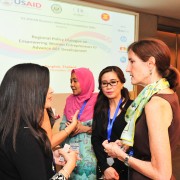USAID brings decades of experience integrating gender into programming, including metrics that have built the case for stronger development outcomes. USAID also has a track record of investing in women in the broadest sense, and a deep and diverse network among development partners, investors and social enterprises. USAID is uniquely positioned to lead the way in developing a joint roadmap to build the gender lens investing field through recognition of the numerous ecosystem partners, and ensuring the rigor of evidence connecting a gender lens investing approach to positive financial and social development returns.
Promoting gender equality and advancing the status of women and girls is vital to achieving all development objectives of the United States Agency for International Development (USAID). USAID’s Regional Development Mission for Asia is committed to collaborating with a range of development partners to bridge gender inequity gaps in all programming, with a particular emphasis on the following priorities:
· Advancing inclusive growth by strengthening women’s economic empowerment;

Good morning. It is a great pleasure for me to be here today and to extend a warm welcome to everyone in this Regional Policy Dialogue. I wish to thank the ASEAN SME Working Group as well as the US-ASEAN Business Council for their support in organizing this meeting. I would also like to thank the speakers and resource persons from the public and private sectors and from international organizations for their participation today. They are giving their valuable time to share their rich experiences, good practices, and successes in the area of women’s economic empowerment to help us recommend a strong agenda for ASEAN in the future.
Being LGBT in Asia: the Indonesia Country Report provides an overview of LGBT rights in Indonesia including the effects of laws, policies, culture and social attitudes, and religion, based on research, consultation and the National LGBT Community Dialogue that was held in Bali in June 2013.This overview is followed by an examination of the Indonesia experience of prot







Comment
Make a general inquiry or suggest an improvement.